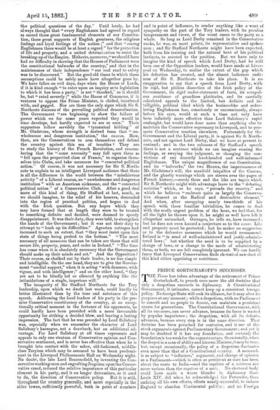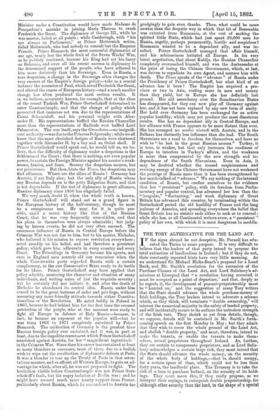PRINCE GORTSCHAKOFF'S SUCCESSES.
THE Times has taken advantage of the retirement of Prince Gortschakoff, to preach once more the old doctrine t)rat only a despotism succeeds in diplomacy. A Constitutional
Government, it intimates, cannot keep up a consistent foreign. policy. No foreign State will seek its alliance, for it may alter its purposes at any moment ; while a despotism, with no Parliament to consult and no people to demur, can maintain a persistent course for generations. The Constitutional Government, with all its successes, can never advance, because its force is wasted by popular impatience ; the despotism, with all its defeats-.
advances, because every step is in the same direction. That doctrine has been preached for centuries, and is one of the- stock arguments against Parliamentary Government ; and yet it may be doubted if it has any foundation, and certainly the foundation is too weak for the superstructure. Occasionally, when
the despot is a man of ability and his own Minister, it may be true, but, except occasionally, the policy of a despotism fluctuates even more than that of a Constitutional country. A monarch is as subject to "influence," argument, and change of opinion as a Parliament—which is often as persistent as ours has been about the route to India—and the caprices of a mistress are more various than the caprices of a mob. No electoral body could have made a worse blunder in diplomacy than Louis XIV. did when he acknowledged the Pretender, thua undoing all his own efforts, efforts nearly.successful, to induce England to abandon Continental politics ; and no Foreign. Minister under a Constitution would have made Madame de Pompadour's mistake in joining Maria Theresa to crush Frederick the Great. The diplomacy of George III., while he was master, failed at all points ; while Castlereagh, with "his eye always on Parliament," as Prince Metternich writes, foiled Metternich, who had nobody to consult but the Emperor Francis. Prince Bismarck, the most successful diplomatist of our age, nearly lost the whole fruit of the Seven Weeks War, as he publicly confessed, because his King had set his fancy on Bohemia, and owes all his recent success in diplomacy to the determined support of the people, who have adhered to him more deCisively than his Sovereign. Even in Russia, a true despotism, a change in the Sovereign often changes the very essence of the Empire's foreign policy—take as a crucial instance the accession of Paul, which saved Frederick the•Great, and altered the course of European history—and a much smaller change has often produced the most serious results. It is, we believe, accurately known, for example, that at the close of the recent Turkish War, Prince Gortschakoff determined to enter Constantinople, and that the change of policy which prevented that immense act was due to the representations of Count Schouvaloff, and his personal weight with Alex- ander II. His representations baffled the Russian Chancellor more than the representations of Radicals ever baffled Lord Palmerston. The war itself, says the Grenzboten—no insignifi- cant authority—was due to the Princess Dolgorouky ; while we all know that the most cherished designs of Russia were shattered together with Alexander II. by a boy and an Orsini shell. If Prince Gortschakoff would speak out, he would tell us, we be- lieve, that the difficulty of diplomacy under a despotism is the fickleness of the Court ; that there is nothing, not even popular power, to sustain the Foreign Minister against his master's weak- nesses, fancies, and fears. Secrecy the despotism secures, but not persistence. But then, hints the Times, the despotism may find alliances. Where are the allies of Russia ? Germany has Austria, if not Italy also ; but the only ally of Russia whom any Russian depends on is the petty Bulgarian State, and that is not dependable. If the test of diplomacy is great alliances, Russian diplomacy since 1856 has singularly failed.
We very much doubt if, when the whole truth is known, Prince Gortschakoff will stand out as a grand figure in the European history of the half-century, though he must be a conspicuous one. He may, for it is quite pos- sible, amid a secret history like that of the Russian Court, that he was very frequently over-ridden, and that his plans in themselves were always admirable ; but judg- ing by known events, he did not very often succeed. The enormous influence of Russia in Central Europe before the Crimean War was not due to him, but to his master, Nicholas, who believed it his mission to repress revolution everywhere ; acted steadily on his belief, and had therefore a persistent policy, which gave him adherents in every country and every Court. The Princelings in Germany became his agents, and even in England men scarcely old can remember when the whole Cons3rvative party regarded Russia with a certain complacency, as the one Conservative State ready to do battle for its ideas. Prince Gortschakoff may have applied that policy adroitly, mastering the character and situation of many individuals, and writing notes of just the requisite severity ; but he certainly did not initiate it, and after the death of Nicholas he abandoned its central idea. Russia under him ceased to be the great buttress of order and privilege, without assuming any more friendly attitude towards either Constitu- tionalism or the Revolution. He acted boldly in Poland in 1863, because he had behind him for the first time the aroused patriotism of the people, who at the moment were ready to fight all Europe in defence of Holy Russia—because, in fact, he became an exponent of the popular will—but he was from 1866 to 1871 completely outwitted by Prince Bismarck. The unification of Germany is the greatest blow Russian foreign policy ever sustained, and it was, in part at least, due to the impolitic resentment which Prince Gortschakoff nourished against Austria, for her "magnificent ingratitude" in the Crimean War. Since then his career has contained at least as many blunders as successes; most of them due to a foolish wish to wipe out the recollection of diplomatic defeats at Paris. It was a blunder to tear up the Treaty of Paris in that osten- tatious manner, and so affront all Western Europe, to gain an ad- vantage for which, after all, he was not prepared to fight. The hesitation visible before Constantinople was not Prince Gort- schakoff's fault, but his angry isolation at Berlin was ; and he might have secured much more hearty support from France, particularly about Bosnia, which he surrendered to Austria too grudgingly to gain even thanks. Then, what could be more unwise than the despotic way in which that bit of Bessarabia was extorted from Roumania, at the cost of making the spirited little State which had just spent 20,000 men for Russia, angrily, perhaps permanently, hostile and suspicious ? Roumania wanted to be a dependent ally, and was in- sulted. Prince Gortschakoff managed that affair himself, and his arbitrariness irritated all Europe. In his very latest negotiation, that about Kuldja, the Russian Chancellor completely overreached himself, and won the Ambassador at the price of losing the Chinese Government, which, at last, was driven to repudiate its own Agent, and menace him with death. The Times speaks of the " advance " of Russia under the Presidency of Prince Gortschakoff, but what kind of an advance has it been ? The Empire has acquired a pro- vince or two in Asia, costing more in men and money than they yield, but in Europe she has definitely lost ground. Her old ascendancy over the Scandinavian States has disappeared, for they can now play off Germany against her, and it has not been replaced by any new form of amity. Her hold over Germany has been exchanged for an active popular hostility, which may yet produce the most disastrous results. She has no dependent ally in Central Europe, and her alliance with France appears to be more distant than ever. She has arranged no modus vivendi with Austria, and in the Balkans has distinctly less influence than she had. The South Slavonians see a road to freedom for themselves, and have no wish to "be lost in the great Russian morass." Turkey, it is true, is weaker, but that only increases the readiness of Europe to interfere in Turkey's affairs, and the weakness is more than compensated by the new strength and in- dependence of the South Slavonians. Even in Asia, it may be doubted whether the roused suspiciousness and reviving energy of the Chinese Government have not weakened the prestige of Russia more than it has been strengthened by her much-talked-of "advance." We say nothing of the internal condition of Russia, but confine ourselves to the evidence that her ." persistent " policy, with its freedom from Parlia- mentary and popular control, has advanced her less than the "irregular," "fluctuating," and weak diplomacy of Great Britain has advanced this country, by terminating within the Gortschakoff period the old hostility of France and the long jealousy of America, and spreading everywhere the belief that Great Britain has no sinister ends either to seek or to conceal ; while she has, as all Continental writers avow, a " persistent " policy of her own, with which it is most dangerous to meddle.



































 Previous page
Previous page